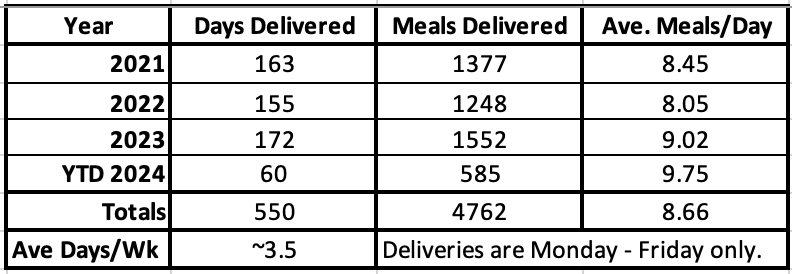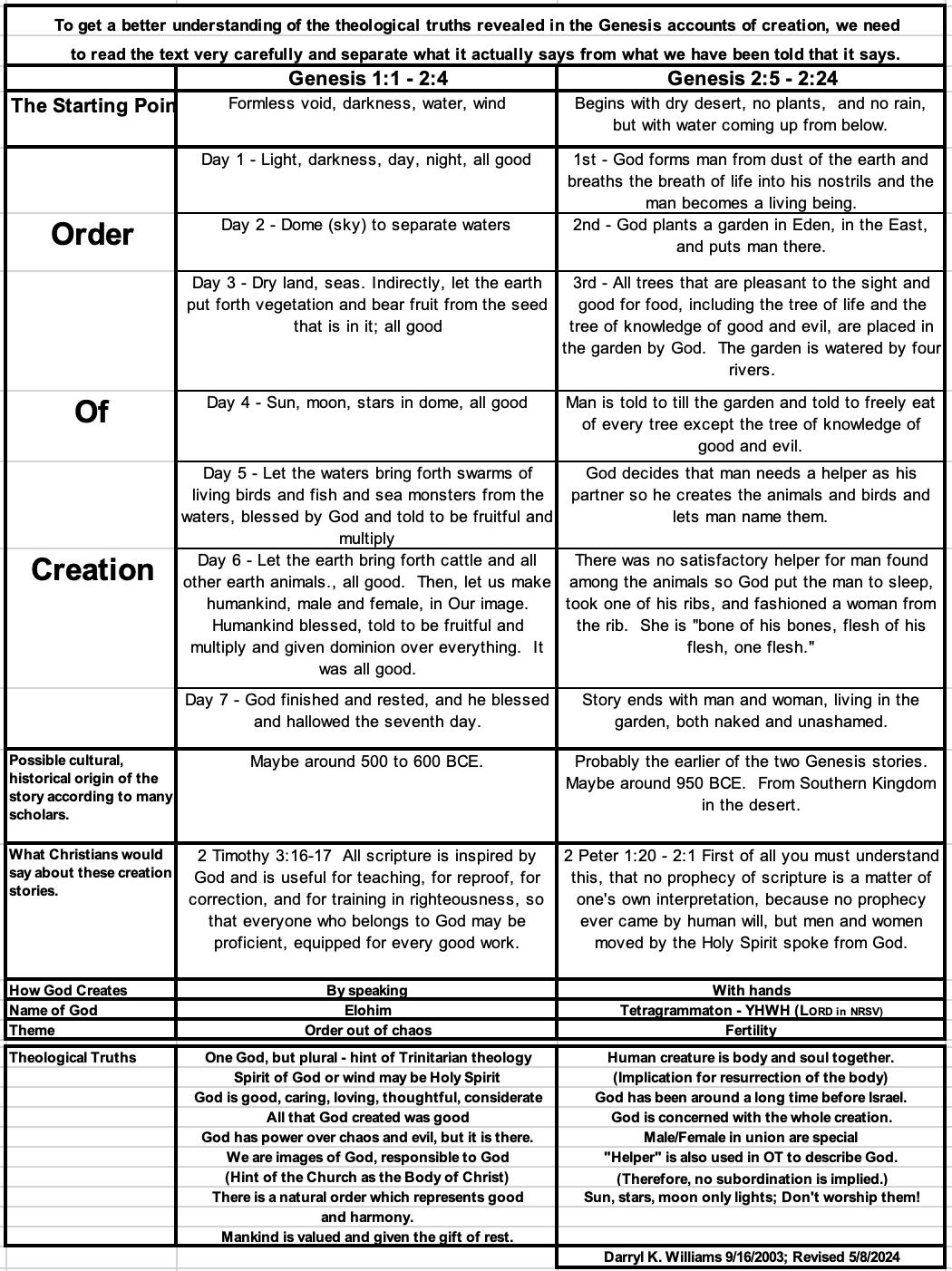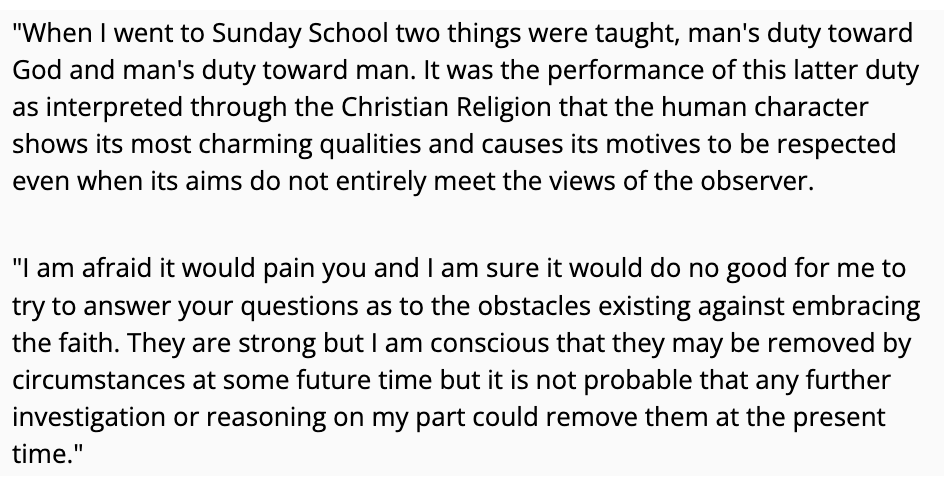Introduction
Yesterday I delivered Meals on Wheels, a short route that time with only seven stops. The last stop was to see a gentleman who is 102 years old. I’ve delivered to him for at least two years. He used to meet me at the door with a welcoming smile and tell me how glad he was to see me. Now he is bedridden, barely able to talk, wondering why he is still alive. The last few times I have delivered to him, I have taken a half pint of ice cream as an addition to the meal we provide. He says he loves ice cream. I don’t know for sure that he still enjoys it, but I still take it, along with a half pint for his care-giver, a hero in my opinion. I love and enjoy these sobering and inspiring visits.
The History
Ash Wednesday 2021 was coming up and I was wondering what to give up for Lent. Giving up time to take on a new or expand a current service activity has always appealed more to me than giving up some food, beverage, or normal routine.
I had been aware for some time of Meals on Wheels (MOW). I have a clear memory of being engaged in a Home Works of America project at the home of an elderly woman and seeing a man deliver a meal to her. She was sitting on the porch and he just placed the meal on the banister near her and turned and left. No interaction at all. I had the thought that I would certainly take a very different approach if I were an MOW deliverer.
So, in the winter of 2021, I decided to volunteer and showed up at the Senior Resources Millwood Street headquarters on Ash Wednesday looking for information. The volunteer coordinator had a group of sorority girls from the University of SC being briefed for their one-day service project. I joined them, got the essential information, and took on a route. I had trouble finding some of the addresses and had little idea about what to say to the recipients, but I enjoyed it and decided to make it a habit.
The Statistics
I’ve been delivering now for 39 months and have delivered about 4700 meals. My engineering background almost guaranteed that I was going to keep some records of the activity. Here are the statistics, not to brag (some others do more), but just to give my opinions and observations some credibility.

More than a Meal
Getting involved is justified by the joy that comes from interactions with recipients, showing and receiving some love and respect, and getting better and better at delivering More than a Meal (The organization motto). Real success is in the joy that comes from brightening the days, in some small ways, of the meal recipients. More on that later.
Routes and Clients
MOW Routes vary and clients come and go on a weekly basis. Necessary information about the individuals and where to find them is on a phone APP that works like a charm and is a joy to use.
Not all clients are destitute. Some are just elderly, have lost the ability to take care of themselves, and need assistance. Some are truly destitute and live in places volunteers may be uncomfortable visiting.
Some clients are joyful and greet volunteers with smiles and thanksgiving. Some are depressed or worried or just unhappy. Some have family members around, perhaps taking care of morning and evening meals, and some are completely alone.
Most are elderly, and it is not unusual to find that a client has died or moved to assisted living or hospice care or been admitted to a hospital since the last visit. Such changes are sources of sadness for volunteers who have gotten acquainted with them.
Some clients will never be seen or engaged. They will leave instructions about where to leave the meal. Those are always disappointing but just something to get used to.
Volunteers are reminded every day they serve that so many people are in worse shape than themselves.
This Post
My motive for this post is to encourage interested folks to give MOW a try. Here are suggestions for those who will do so.
Relax and Take Your Time – This process is about more than delivery of a meal. A little chat can do a world of good for both volunteer and recipient.
Remember the Clients and Call Them by Name – Start with a smile and address first or second time clients as Mr. Mrs., or Miss Last Name and tell them your first name. After a few visits, switch to Mr. or Mrs. or Miss First name. A little later it may be comfortable to use the first name. “Hi Mary or Hi Bill, I always love to see your smile.”
Show You Care with Compliments and Questions – If there is a nice yard, pretty flowers, new paint on the house, colorful dress, or good house-keeping, compliment them. If they are smiling, thank them for the smile. If they are waiting at the front door, thank them for being ready. Ask how long they have lived there or if they have some children or other relatives nearby. Tell them the food smells good and you hope it tastes good. If they say they love you, tell them you love them.
Listen to the Clients, Even Their Longwinded Stories – Be willing and able to spend a few minutes with the client. After five minutes or so it is fine to say that other clients are waiting on their meals and offer a warm goodbye. Some clients will talk for thirty minutes if there were time and patience. Of course many clients don’t want to talk or be friendly. They just want the food and that is OK.
Do Something Special and Unusual When There is an Opportunity – In one case I had given a lady’s no fish meal to someone else by mistake. I asked her if she would like a hamburger, and that brought a big smile. So I drove to a nearby Sonic Drive In, bought a burger, and took it back to her. She always reminded and thanked me on subsequent visits. One house I referred to Home Works of America and they came and did some repairs. If a homeowner is not home on the first try, I often call or come by later in the route before giving their meal to somebody else. Sometimes they have been away for a short time and are back home. They really appreciate the second try.
Give Thanks for the Opportunity and Pray for the Clients – What we are doing is more important for us than for the client. If we don’t deliver, somebody else will. Our satisfying job is to deliver more than a meal in various ways at various times consistent with our skills and interests. Pray for the clients between visits.
Acknowledge Caregivers – Caregivers, professionals or family members, are heroes. Acknowledge and thank them for what they do. An elderly lady invited me in for a chat with her disabled husband and their joyful caregiver. That was a fun visit.
Drive Safely and Defensively
Maps, GPS systems, client lists, and U-turns, not to even mention coffee and music, can be distractions. Be careful, and always expect the other driver to do the wrong thing.
The MOW Organization
For information about Meals on Wheels America and opportunities to serve, go to their website. Enter a zip code to find out what is going on in your community. In Columbia, SC, the key contact is Senior Resources, 2817 Millwood Ave, 29205. Service opportunities are available daily, once a week, once or twice a month, or once in a while. It’s a good way to spend a lunch hour.
I’m already looking forward to seeing my 102 year old friend again and hoping he will be suffering less.













